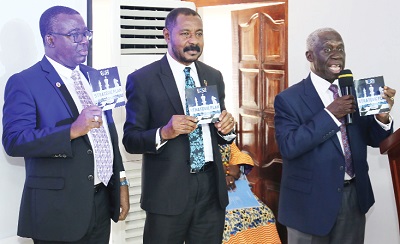
Value for Money guidelines in the offing — Senior Minister
The government has said it is formulating guidelines that will prevent the bloating of the cost of construction of public projects.
The Senior Minister, Mr Yaw Osafo-Maafo, said the guidelines, which would ensure value for money of all government projects, would be presented to the Cabinet for approval by the end of this year.
“My office conducted a research and gathered that hospitals built by religious bodies under the same specifications cost about two-thirds the cost of hospitals built by the government.
“We want to prevent a situation whereby projects built by the government are more expensive than the ones built by charitable and religious bodies,” he said.
Mr Osafo-Maafo said this when he launched the five-year strategic plan of the Ghana Anti-Corruption Coalition (GACC) in Accra yesterday.
Advertisement
He said the government lost huge sums of money through the inflated cost of public infrastructure, a situation which had become a drain on the country’s finances and a drawback to development.
“We will, therefore, put out some fundamental guidelines to ensure value for money for all government projects,” he stressed.
Strategic plan
The GACC is a cross-sectional grouping of public, private and civil society organisations (CSOs), with focus on promoting good governance and fighting corruption in Ghana.
It’s five-year strategic plan will cover 2020-2024 and will hinge on a plan to make Ghana a corruption-free country.
Among its strategic priorities are the education of the public on the forms of corruption and its impact on society, campaign for the strengthening of anti-corruption laws and systems and a sustained advocacy for investigations, prosecutions, sanctions and asset recovery.
Corruption in Ghana
Although Ghana is one of the most stable countries in the world, with strong democratic credentials, corruption is said to be pervasive in all sectors and has become part of the national fabric.
In June this year, the Centre for Democratic Development (CDD) said its studies had shown that the public purse had, since 2017, lost GHc9.6 billion to corrupt practices.
Transparency International ranked Ghana 78th out of 180 countries on its 2018 Corruption Perception Index.
The government has instituted certain measures, such as the creation of the Office of the Special Prosecutor (OSP) and the passage of the Right to Information Bill, to help in the fight against corruption.
Corruption is not politics
The Senior Minister said the efforts to stem out corruption would become meaningless if Ghana continued to give corruption, which is a crime, political colourisation.
“Corruption is a crime and we must approach it from that angle. We must stop giving corruption political colours. The whole country is divided along NDC and NPP axis and people defend wrong based on political affiliations. We cannot fight corruption in that manner. Rather, we must name and shame to make corruption unattractive,” he said.
Corruption is immoral
In his address, the Australian High Commission to Ghana, Mr Andrew Barnes, described corruption as not only a crime but also an immoral act.
“As an atheist, it intrigues me that for a strong Christian country such as Ghana, corruption is such a problem here,” he added.
Build capacity
The Board Chairman of the GACC, Nana Osei Bonsu, said the promulgation of anti-corruption laws was not enough to fight corruption in the country
He stressed the need for the government to build the capacities and capabilities of investigative bodies to enable them to unravel corruption-related malfeasances.
“We live in a time when our youth can no longer get jobs by merit but by association with powerful political and non-political figures. We live in a time when confidence in our state anti-corruption institutions is waning,” Nana Bonsu, who is also the Chief Executive Officer of the Private Enterprises Foundation (PEF), said.
